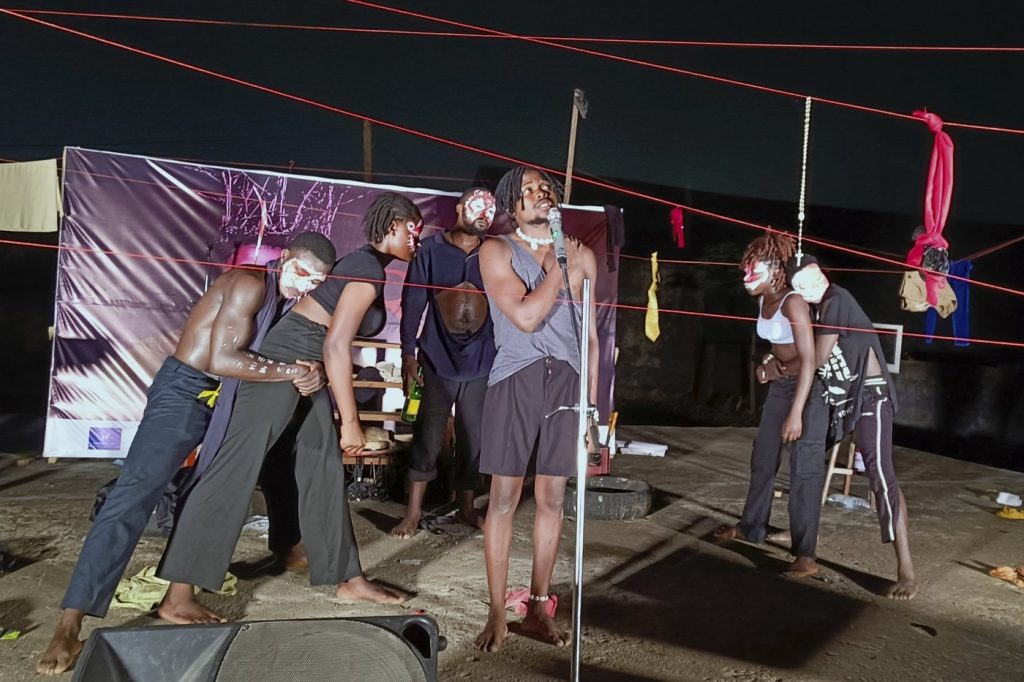BUEA, Cameroon (AP)—In a powerful gathering held in Buea, a woman screamed when she spotted what appeared to be a corpse—a sheet-covered figure on a stretcher. As volunteers brought the figure onto the stage, 24-year-old Boris Taleabong Alemnge, who performs under the stage name "Penboy," recited a poignant poem entitled "Death." The audience, witnessing the act, responded with real tears and sorrow, reflecting the weight of ongoing conflict in the region.
Alemnge is part of a group of artists who are using spoken-word poetry to denounce the bloodshed in Cameroon’s English-speaking areas, where separatist groups are embroiled in conflict with government forces. This civil war, which has escalated since 2016, has resulted in the deaths of approximately 6,500 people—most of whom are civilians—and has displaced nearly one million individuals from their homes.
The art of spoken word has gained significant recognition in Cameroon, particularly through voices like Alemnge's, who emphasizes that this medium can confront the everyday dangers and traumas of life in a war zone. “Death is inevitable, yet many people don’t even want to think about it,” Alemnge stated after a performance meant to launch his latest album, “RED.”
Audiences have responded positively to these performances, resonating with the rhythms and emotional intensity of spoken word. Prosper Langmi Ngunu, who attended one of Penboy's performances, remarked, “I have watched crowds fall silent, then rise like waves, because his words have the power to heal.” Mental health challenges are rampant in the Anglophone regions, as nearly everyone has lost someone to the conflict, adding another layer of complexity to the situation.
“RED” revisits themes from Penboy's inaugural album, “Natives of the Universe,” advocating for shared human experiences and questioning the vanity that leads to such a high human cost in wars. Despite the linguistic tensions exacerbated by the conflict, Penboy has toured multiple Francophone regions in Cameroon, presenting his messages of peace and empathy, and he noted that some listeners have even become advocates for change.
International and local organizations continue to document widespread atrocities, including looting, killings, tortures, and sexual violence. Both government forces and separatists are reported to have engaged in violence against civilians. The historical context plays a vital role in the ongoing discord; Cameroon, once a German colony, was divided between British and French rule after World War I. The country united as a bilingual state upon its independence in the early 1960s, but subsequent constitutional changes diminished the rights of the English-speaking minority, provoking protests that escalated into violence.
The English-speaking population, which constitutes about 20% of Cameroon’s roughly 30 million citizens, feels marginalized by the Francophone majority. The conflict intensified in 2016 when the government attempted to enforce the use of French in English-speaking schools and courts, leading to protests that were met with violent repression and prompting some to take up arms against the government.
Spoken-word events like Penboy's gatherings are indicative of the growing courage among citizens to express outrage. Another spoken-word artist, known as Camila, remarked, “Since we cannot pick guns to fight, we use the power of the spoken word to send across our message.” She cited an incident where a soldier shot a schoolgirl, illustrating the raw emotions that fuel her art.
Other poets, like Sandra Nyangha, also engage with the public through their works, expressing frustration with the ongoing violence. She declared, “If you can give the order for something such as war to start, then you can also give the order to end it.”
For Penboy, these spoken-word events are part of broader efforts to bring arts to communities afflicted by crisis. He has initiated projects like Students In Activism to empower youth through writing and performance. The war has deprived many of their education, and Penboy believes that artists have a responsibility to use their talents to advocate for meaningful change in society.











